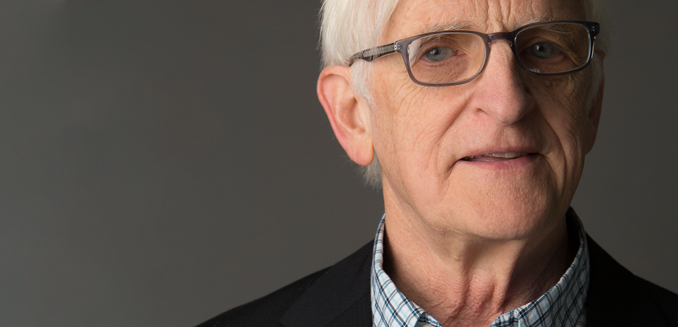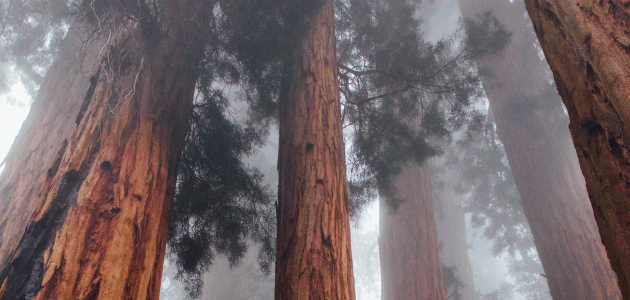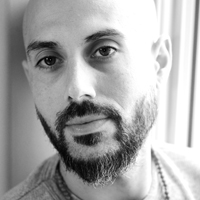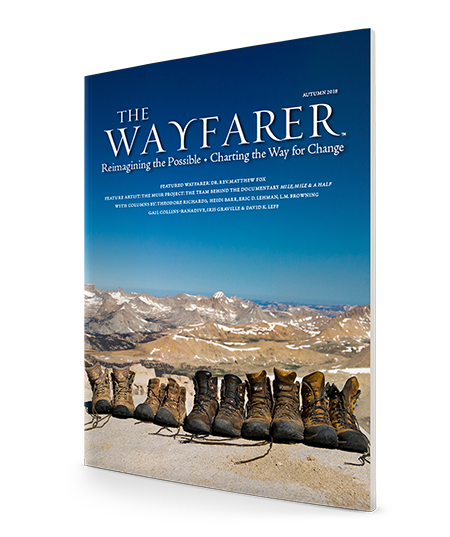
On the Path of Praise
An Interview with Bestselling Author
Dr. Rev. Matthew Fox by Staff Writer Theodore Richards
Richards: You’ve been working for decades to fight against injustice and fascism. What is it like to see the rise of Trump? Are you surprised? What it is an appropriate, prophetic response to Trump?
Fox: It’s true that a lot of the fascism emerging from Trump and his surrogates is déjà vu. I saw this very strongly in the Vatican for 34 years under two popes and I fought it. But it’s still a little dispiriting to see it played out from the White House—and congress—on a daily basis. But no, it’s not a surprise, because it’s baked into so much of what’s been unfolding in our culture. For example, the right-wing media, which is so dominant. A friend told me once he drove across the country and there are areas where you can’t get NPR, but you can always get Rush Limbaugh, spouting his vile hatreds across the country as he has done for years. And of course, Fox News, which is all the worst elements of Limbaugh wrapped in Rupert Murdoch’s billions of dollars and distorted so-called patriotism. It’s become a form of state television that is not only always supporting Trump but provides a feedback loop: he watches Fox News and forms his policies that way and then they return the favor. It was striking that we learned the other day that the President, on Air Force One, threw a fit when Melania was watching CNN instead of Fox News. Henceforth, he ruled, only Fox News would be showing on Air Force One.
Then you have Citizens United, with the Supreme Court promoting this fascist notion that corporations are people and money is protected speech. It threw the door wide open for the powers of corporate monopoly and oligarchy. For a government of the corporations, by the corporations and very much for the corporations. We could have expected it. Naomi Klein talks about this—how Trump is the most recent and unvarnished, but at least he’s not covering things up. He’s showing us the soul of extractive capitalism, and what greed does to the soul of a person. And what it will do to the soul of the nation if it is allowed to continue unabated and in fact remains very much abated by such bodies as the Supreme Court and a supine congress.
But there’s a silver lining—this is also why there’s a strong attraction to socialism, and why people like Alexandria Ocasio-Cortez in New York are getting elected. What can we do about it? Number one is the 2018 election. There should be a greater enthusiasm and bigger turnout from the left for the 2018 election than for the 2016 presidential election. Congress could be doing a lot. Outrage is a strong motivator in politics.
Then, of course, hope is about movements. As Naomi Klein says, we need a “full-throated debate” about values. Parkland, Black Lives Matter, Occupy, Standing Rock—that’s where the new politics has to come from. So, I have some hope that the younger generation—which is inheriting the death of democracy and the death of the earth itself—can be less in denial, have a more unvarnished view of reality, and respond accordingly and the politics can follow.
Richards: You’ve had a lot of conflict with the church, primarily with the regime of John Paul II and Benedict. There is a sense that Francis is a more progressive Pope. What’s your take on him?
Fox: In many ways he is more open and progressive. For example, his encyclical on the environment, Laudati Si, is a profound document. I know scientists who are studying it. And, fortunately, it brings in the spiritual dimension, the dimension of the sacred, to the debate. Therefore it’s very much in the tradition of Deep Ecology, which is about de-secularizing the debate, recognizing it’s not just about politics and economics but also about the human soul and the souls of other creatures that have rights themselves. And I’m happy to say that the encyclical was written by one of my students, Sean McDonough. So those two other popes called my work “dangerous and deviant” for 34 years, and here’s a pope who’s plagiarizing it! [Laughs]. Rush Limbaugh called Francis a Marxist. I think that’s kind of a nice feather in the pope’s hat.
Richards: To be attacked by the likes of him is high praise!
Fox: Exactly. And Fox News hated the encyclical, too. One of the things Francis does—and not just in the encyclical—is attack Wall Street, the “idolatry of money” as he calls it that is running our society and sense of community and brings out the worst in people. He’s talking about the “narcissism” (his word) of our species. He’s right. So I give him credit for all of that. And he’s trying to shake things up in the church. But he’s not going to succeed, because the church as we know it has to die—for example, for women to be allowed equal rights. I think he wants change, but the system is thwarting him. In order to regain the values that Jesus taught a lot of the church system has to melt.
But a real negative strike against Pope Francis is the canonization of Junipero Serra, who ran a series of missions here in California, which were really concentration camps. It was linked entirely to the Spanish empire, a link of religion and empire, enslaving the indigenous people. Serra was the leader, and the Pope pronounced him a saint. I was working with the Native people of California who were opposing the canonization, and one leader said that if Francis goes through with this canonization “he is making war with indigenous people all over.” That’s how serious they looked at it. So that will forever be a negative mark on his legacy. But like the rest of us Pope Francis flawed. He is a human being after all. Overall, I think he wants to do some good things, but he’s constricted by his office. I would like to see him and the Dalai Lama do a lecture tour together on five continents and talk about the pressing moral issues of our day including education; women; youth; economics; environment. Such a tour would draw media attention and spur lots of important debate about important value decisions that are staring our species in the face.

Richards: Do we even need a Church? What is the role of religion today? How does the Order of the Sacred Earth fit into the contemporary role of religion?
Fox: Thomas Aquinas says the essence of religion is gratitude. He calls it a virtue within the virtue of gratitude. He’s not saying that the essence of religion is churches or buildings or schools or papacies or the Bible. [Laughs] He’s saying the essence of religion is gratitude. I think that’s really important and really radical. He’s saying that what religion is here to do is to teach us to praise, because praise is an act of gratitude. And that will never go away.
I like that he defined religion as a virtue not an institution. So he’s not looking at it from a sociological perspective but from a psycho-spiritual one, that as human beings we need to be grateful. We need to wake up to the awe and wonder and gift of existence and be grateful. Deepak Chopra points out that millions of people are leaving organized religions but the world isn’t getting any better. The number one spiritual issue of the 21st century he says is evil—it isn’t diminishing just because people leave the churches. So I think there is a certain loose sense of hope that because organized religion is diminishing that evil is diminishing. But there’s no guarantee of that.
So what can we do? The image I’ve been using is “taking the treasures from the burning building”; that is, take whatever is the best that religion has to offer, whether it’s western or eastern or indigenous. For example, religion can teach us to deal with the reptilian brain and teaching us to be still, like with the freeing of the boys soccer team from the cave in Thailand. They wouldn’t have survived if their coach hadn’t taught them to meditate. Imagine living for 14 days in complete darkness—how frightening! What a rite of passage! I think that religion played an important role because [their coach] knew how to meditate because he’d been a Buddhist monk for ten years. So there are treasures embedded in our religions.
There is the call to justice and transformation both internal and societal that the prophetic tradition of the Jewish prophets (Jesus among them) and many great souls since have tried to practice from MLK Jr and Dietrich Bonhoeffer to Dorothy Day and Thomas Merton and Sister Dorothy Stang who was assassinated in the Amazon for defending the rain forest and the peasant farmers there. Religion at its best awakens the mystical capacity we all possess for love of the world and love of one another and awakens the courage to live that love to the fullest.
We are currently launching the Order of the Sacred Earth which is an effort to lasso these treasures, from whatever tradition. What’s neat about an order is that it’s a shortcut. They just pop up when times are challenging. Religions take centuries to change. This isn’t a religious order beholden to a particular religious institution but a spiritual order. It’s trying to gather up the spiritual energy, wherever you may find it, around one focused idea, which is to take a vow to be the best lover and defender of the earth.
Vows are powerful things; they focus you. Marriage vows, for example. Gandhi took lots of vows. Orders and vows are found around the world, East and West. Why not birth an order that is both a movement and a community that is truly global, that draws from all the world traditions, but orient it around this one project, saving the Earth? It’s exciting. The book on the “Order of the Sacred Earth” came out this week. Its first directors are a 28-year-old woman and a 33-year-old man, so the young can lead though it is also welcoming to elders (like myself). I think it offers hope because it may prove to be a gathering place for people whether they are in or out of organized religion. We’ve even had atheists join.
Richards: Talk about your next book, Naming the Unnameable. Why was it important to write this book now?
Fox: I think the word “God” carries a lot of baggage with it. [laughs] I think it’s become idolatrous. Like when the president of Liberty University calls Trump “a gift from God”—well, that’s a different God from the one I’ve been learning about for 77 years. So, I think it’s time to deconstruct our God-talk and not just nod our heads in a pious fashion just because the name “God” is invoked. We’re now finding that prayer breakfasts have been infiltrated by Russian spies and the NRA! Again, I’m not surprised. These are things that anyone with any awareness already knew about—that these “prayer-breakfasts” are a complete distortion of the meaning of prayer.
Jesus of the gospels was so strong on this, talking about the hypocrites, the Pharisees, the “whitened sepulchers.” Politicians today hide behind the name of God. Look at Paul Ryan, talking about God while he passes bills that give billionaires tax breaks but take away from education and healthcare and things the poorest among us depend on—I mean, that’s not God, that’s idolatry, the god of wall street. To Pope Francis’s credit, he names this when he talks about the idols of Wall Street. So it’s time to re-think our god talk.
So, what I do in this book—and it may be my most radical book I’ve written, although it is presented in a very reader friendly way—is I draw from two very traditional sources, Denis Areopagite, a 6th century monk, and Thomas Aquinas, a 13th century mystic and philosopher/theologian. Aquinas says every being is a name for God. So I choose 89 names for God that I think are useful. And there is also the “Apophatic” divinity that Denis the Areopagite speaks to, the idea that god has no name at all. (Of course, I acknowledge the Muslim tradition and its wonderful practice of “99 Most Beautiful Names for God.”)
I’m trying to set off fireworks in people’s minds about how wonderfully alive our language could be for divinity if we could get out from under the burden of political idolatry and religious shibboleths. I’m hoping that this book penetrates and opens up peoples’ hearts, minds, and consciousness to new meanings, which are based on experiences of the divine, not some kind of frozen dogmas about who god is and isn’t.
Richards: In addition to being an author and spiritual teacher, I think it’s fair to say that you also see your self as an educator. Moreover, you’ve been at the forefront of seeing the need for transforming education if we are going to transform society and spirituality. What do you see as the greatest failings we have in our educational system? What changes do we need at his moment?
Fox: I respect very much your work with the Chicago Wisdom Project and your previous work with me at YELLAWE in Oakland.
Richards: Thanks.
Fox: I see the greatest failing as that we are not teaching values, because we are ignoring intuition. Einstein says that values come from the intuitive, not the intellect. But the intuitive is ignored in our schools. The rational side gets all the attention. For example, whenever politicians talk about improving education, they always say we need more science, we need more tech, we need more math. It’s not that there’s something wrong with these things, but we also need more art, we need more of a journey into the intuition, where values are found. Einstein said not to overvalue the intellect because values are not created there but in our intuition and deepest feelings.
The role of the arts is to put us in touch with our deepest feelings. Again, this is why in my models we always balance the intellectual with what we call “art as meditation.”. That’s the number one thing. Right now, we have what I call “knowledge factories” that turn out people with PHDs who are knowledgeable but whose pathway to values is very underdeveloped. Where are the values? They just come by accident. In my book The AWE Project: Reinventing Education, Reinventing the Human I developed what I called the “Ten Cs” [Cosmology, Chaos, Creativity, Community, Courage, Contemplation, Character, Compassion, Critical Consciousness, Ceremony]. I deliberately created this for public schools because I know there is a big hullabaloo about talking about “religion.” The ten Cs are not religious as such, but they are about values.
So we have to move from knowledge, which is Modern, to wisdom, which is pre- and post-modern. Wisdom includes the feminine, it includes the cosmos, it includes the earth, it includes our deep feelings, as well as knowledge, and it is about creativity.
Richards: This seems to influence everything we’ve been discussing, whether it’s our religious institutions or our political ones.
Fox: Absolutely. Ultimately, it’s about joy. How do we find joy in the midst of so much suffering and loss? What is facing the human species is so severe. Aquinas says that the worst thing a person can do is teach despair. The media and politicians in denial are very busy today teaching despair to the younger generation. It is a gross scandal. Maybe the facts about our troubles can really wake us up. The Catholic monk Thomas Merton said that today wisdom must pass through sorrow. Sorrow and Grief and Loss might wake us up and out of our slumber and move us toward wisdom.

Richards: Lastly, I want you to speak to the youth. We’ve seen an upsurge in activism among the youth, from Black Lives Matter to Occupy to Standing Rock to Parkland. As an elder, what advice might you give to an 18 year old in today’s world?
Fox: First of all, I congratulate them. They give hope to all of us.
One thing I’d say is to look for intergenerational wisdom, for mentors and elders and link up with them. This is one thing I like about the OSE order—that it’s intergenerational. Because I don’t think any single generation has all the answers. But we have to work out the questions together.
I’d also tell them to plunge into their own hearts and their own intuitions and deep feelings to discover what is the ethical thing to do. Find your values and live and work and train yourself around them. Think about the future generations to come. And dig deep and ask the universe to help you discover what you are called to do in this world at this critical time. So many areas need attention.
Also tap into their anger, the third chakra, your moral outrage, burn it as a fuel but steer it by that which you love. The warrior is different from the soldier because the warrior is in touch with the love energy, acting not to destroy but to bring forward the love and beauty. And learn what is truly joyful about life and meaningful and beautiful and learn to savor that including learning to be still, to calm that reptilian brain so that your heart brain can blossom. As the poet Rilke put it, “Walk your walk of lament on a path of praise.” Yes, learn to praise.

Theodore Richards
Staff Writer and Editor
Theodore Richards is a philosopher, poet, and novelist. As the founder of The Chicago Wisdom Project, editor of the online magazine Re-imagining: Education, Culture, World, and a board member of Homebound Publications, his work is dedicated to re-imagining education and creating new narratives about our place in the world. He is the author of seven books and numerous literary awards, including two Nautilus Book Awards and two Independent Publisher Awards. His next book, A Letter to My Daughters: Remembering the Lost Dimension & the Texture of Life, is released on October 9th, 2018 from Little Bound Books. He lives in Chicago with his wife and daughters.
This is a selection from The Wayfarer’s Autumn 2018 issue.
Order the entire issue in either print or e-edition in our store.
The Wayfarer is a biannual magazine released in print and e-edition every spring and autumn. We publish a high-quality journal of literature and art that inspires and points the way for visionary-yet-practical change. By our definition, a “wayfarer” is a wanderer whose ability to re-imagine the possible provides the compass bearings for those on their way. The Wayfarer’s mission is to chart the way for change by building and empowering a community of contemplative voices. We seek to release a publication that builds and empowers a community of contemplative voices and serves as an agent for cultural transformation.
Subscribe to the Print Edition • Subscribe to the e-edition • Browse Featured Articles
To bring each issue of The Wayfarer to fruition, it takes hundreds of hours each season to craft, edit, design, and distribute the journal. If you find joy and enrichment within our features, please consider becoming a supporter with a small donation. There is no set amount. Whether it is .99 or a few dollars, we appreciate any gift you care to give. While at this time we are not a non-profit all donations do go towards ensuring the future of the journal.
Help us Empower Change by Giving a Little Change!
![]()


